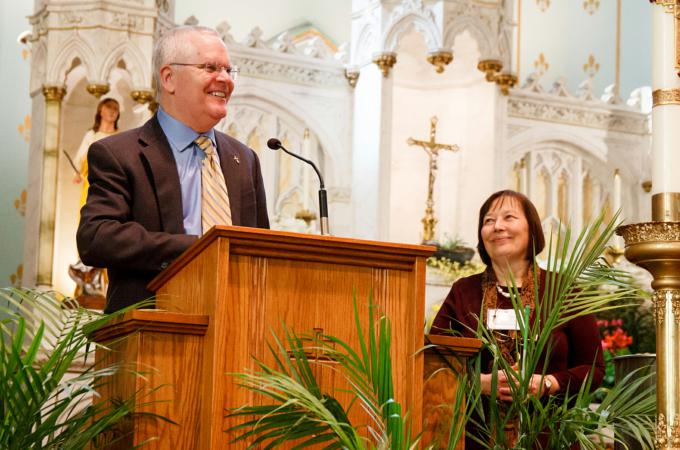Co-Workers conference offers pastoral workers day of reflection
WATERTOWN -- Lay pastoral staff and volunteers, clergy, and religious came together as promulgators of Christ to participate in the 2018 Co-Workers in the Vineyard Conference April 6 at St. Patrick Parish in Watertown.
Sponsored by the Theological Institute for the New Evangelization's Masters of Arts in Ministry (MAM) program, the conference annually serves as both enrichment and a networking opportunity for those who work in the Catholic Church. It typically features a keynote talk from a prominent influencer in the Church, as well as breakout panel discussions.
The theme of this year's conference was "Living our Faith in the Modern World." It was co-sponsored by CatholicTV and Verbum, an online program for studying the Catholic faith.
The day began with a Mass celebrated by Cardinal Seán P. O'Malley and concelebrated by Bishop Robert Reed, followed by words of welcome from Aldona Lingertat, director of the Master of Arts in Ministry program and vice president of administration for the Theological Institute.
Award-winning writer and producer Deacon Greg Kandra of the Diocese of Brooklyn, New York offered the keynote talk. Deacon Kandra, a veteran of CBS News and CBS Digital Media, told the story of how he came to be called to the vocation of the permanent diaconate. The journey took years, but he pointed to two events that seemed to serve as catalysts in his discernment.
The first was the Sept. 11, 2001 terrorist attack; an event that he acknowledged changed the entire world. He was working for CBS in New York at the time, and he ran to work after he saw footage immediately after the first plane struck. He could see the smoke from the office window, miles away from the Twin Towers.
Deacon Kandra, a producer at the time, was told to write news updates on the attack. He said he worked until very early morning the next day. The area was on lockdown -- public transportation had stopped, vehicles were prohibited from the roads, and police and soldiers patrolled the streets. The lights in Times Square were all off, and the world, he said, "was dark."
CBS put him and his co-workers up at a nearby hotel. He had spent the day writing about the attack, witnessing the aftermath, but it wasn't until he was checking out of the hotel after a few hours of sleep that the impact of what had happened really hit him. He saw a fireman covered in ashes and soot, "barely recognizable," checking in, and it was an image that stuck with him.
He realized then the fragility of life and of material belongings. All the awards he had won, all the prestige he had earned over the years, "was worthless," the deacon said.
"It could be gone like that," he said, snapping his fingers.
Catholic, but not immersed in the faith at the time, he began reading the writings of Father Thomas Merton, a mid-20th century American theologian and Trappist monk. His writings inspired Deacon Kandra to attend several retreats at a Trappist Monastery, and it was there that he encountered his second catalyst -- an English deacon.
The deacon also worked in media at BBC, and in speaking to him, Deacon Kandra realized they knew many of the same people. He hadn't really known what a deacon was prior to meeting the Englishman, but the meeting reverberated with Deacon Kandra. He knew, almost instantly, that he wanted to become a deacon.
"Once I had this idea planted, I couldn't let it go," he said. And "for the first time in my life, I decided to trust in God."
He was ordained in Brooklyn five years later. His co-workers at CBS were very supportive of his call to the diaconate, said Deacon Kandra, but he found himself moving on from CBS nevertheless.
With his years of writing experience, he wanted to tell the world a story of hope. "In a world covered in ash, I wanted to tell a story of light," he said.
He worked for the Diocese of Brooklyn for a few years in various capacities, and started his own blog, The Deacon's Bench, which he used to tell his experiences as a new clergy member, and comment on Catholic issues.
He began living his faith in the modern world, he said. It is something that has to begin "with the desire to scatter the shadows, to expel the darkness and bring light to others."
We are all called to radiate light, bringing Christ and hope and love to others in need. We radiate that light in "many way, way we might not even realize," he said.
Look for that light, he urged the participants. Rejoice in it, and share it.
Deacon Kandra's keynote was followed by an overview of Disciples in Mission, that pastoral plan of the Archdiocese of Boston, given by Sister Pat Boyle CSJ, the associate director of the Office of Pastoral Planning.
She spoke about organizing parishes in collaboratives, and what parishes can expect to see in the various phases of the process. She noted the importance of communication between parishes within a collaborative, as well as communication between pastors and parishioners. It should be encouraged and prayed for, she said.
Participants were then invited to lunch, and were given tours of the neighboring CatholicTV Studios. Two breakout panel discussions followed afterwards, one on best practices in parish evangelization, and the other on best practices on social media. The event ended with a closing prayer led by Father Kevin Sepe, pastor of St. Patrick Parish.



















